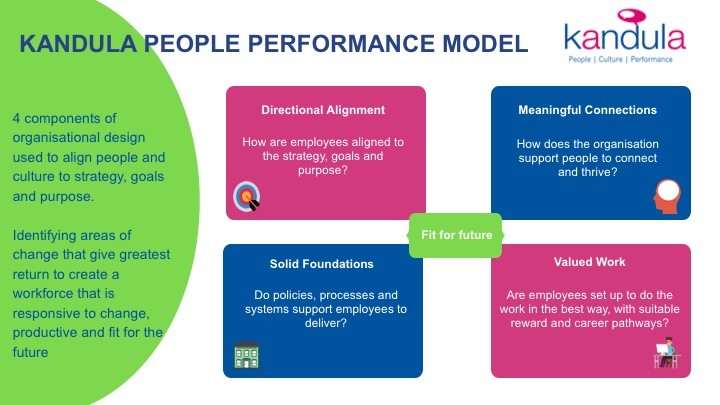A few days ago I posted a blog about the importance for organisations and their employees to have direction and purpose. During crisis and chaos, these can provide an anchor to hold on to. As we see conventional ways of working being tested and challenged, direction and purpose becomes a stronger beacon.
Keeping with the nautical theme, it seems to me that there are going to be several waves of change before we come out the other side and deal with a new normal. One area where this is likely to be true in the way organisations are set up, relates to Valued Work, the third component of the Kandula People Performance Model.
Valued Work
Valued Work is one of the four components that need to be in place for people within a business to be productive, engaged and flexible to adapt to change. The four different components come together to create the organisation’s ecosystem. All parts need to work well for any organisation to thrive or survive.
The elements of Valued Work come together so people are set up to do the work they need to do, in the best way, with suitable reward and career pathways. In an organisation this means:
- Looking at the way the business is structured
- Defining the target operating model
- Looking at the way teams are set up and work together
- The skills and experience required for different roles
- How people are rewarded
- The benefits that are offered
- What the career pathways are
These are the things that organisations should be considering in line with their strategy, but what happens when we’re in crisis? There are a few elements that are currently changing to enable organisations to survive or to provide a service to their customers. Let’s unpick this a little……
Job descriptions and roles
In most organisations people join to do a specific role that matches their skills. In some industries this is changing and people are being asked to be flexible. As an example Marks & Spencer’s are moving staff from the clothes departments to work in the food halls to help with the massive demand. Did a specialist bra fitter expect to be packing shelves? I suspect not.
Or how about the Orthopedic Surgeon who is being asked to offer their services in different parts of a hospital?
For these people, and all others who are doing something different to their normal role, it creates a state of change. And with any change there are challenges for the people involved and the organisation. It can impact productivity, create emotion and change team dynamics. It begins to test the organisation’s structure and whether or not people are doing work that is valued.
Rewards and benefits
As many organisations focus on survival there are also changes to the way people are being rewarded. Workers are being asked to take pay cuts, work fewer hours or take leave. Whilst organisations may value the work that is being done, will people feel that they are doing work that is valued? If people are earning less than they previously did, there is a chance that they may psychologically switch off, become less productive and disengage. This in turn relates to the fourth component in the Kandula Model – Meaningful Connections. I will talk more about Meaningful Connections in a future article.
Part of the way people are rewarded is through benefits, which may include pensions, health cover and life cover. It may also include things such as gym membership, fruit bowls and yoga programmes. If an organisation has to cut any of these services it is likely to have an impact on the way people feel about the organisation and the work they do. How do you decide which ones to cut first? Is it a financial, practical or motivational decision or a mixture of all three?
Everyday we’re hearing more amazing stories about the way people are open to taking on new types of work, create new teams, be flexible in their approach and be rewarded less.
The shifts that we’re seeing in the way work is done and how people are rewarded is part of the journey that organisations are going through as they adapt to the crisis. We’re currently seeing the first wave of actions and responses. I think there will be more waves to come and planning now would help organisations steer their way through to calmer waters. I’ll blog more on this in the future.
I’d love to hear about organisations that are having some great wins as they make these changes as well as those that are struggling with these unchartered waters. For organisations that are grappling with how to adapt and would like to have a chat I’m here to help.
Now could be the time to do a quick review to see what will serve your organisation at this time.



